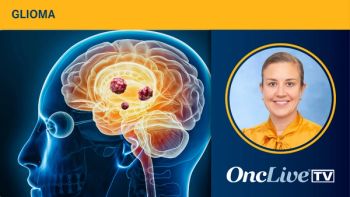
Rolling BLA Submitted to FDA for Omburtamab in Pediatric Metastatic Neuroblastoma
A biologics license application has been submitted to the FDA for omburtamab, previously referred to as burtomab, for the treatment of pediatric patients with central nervous system/leptomeningeal metastases from neuroblastoma.
A biologics license application (BLA) has been submitted to the FDA for omburtamab, previously referred to as burtomab, for the treatment of pediatric patients with central nervous system (CNS)/leptomeningeal metastases from neuroblastoma, according to an announcement by Y-mAbs Therapeutics, Inc.1
The nonclinical portion, as well as part of the CMC portion, of the rolling BLA had been submitted in June 2020, and the completion of the submission is projected to occur within the next 4 to 6 weeks, according to Y-mAbs. The clinical portion of the submission will be based on safety and efficacy data from 2 phase 2 studies: 101 (NCT03275402) and 03-133 (NCT00089245). Data from those trials are expected to be presented later this year.
“As the father of a long-term high-risk neuroblastoma survivor with CNS/leptomeningeal metastasis, I know how important this potentially is for families faced with brain metastasis from high-risk neuroblastoma and I am excited to see the initiation of Y-mAbs’ second BLA submission this year in neuroblastoma,” Thomas Gad, founder, chairman, and president of Y-mAbs said in a press release. “We believe this is a key milestone for families facing CNS/leptomeningeal metastases from neuroblastoma and for Y-mAbs.”
Omburtamab is a monoclonal antibody that was developed to bind to the surface of neuroblastoma cells. When linked to a radioisotope, it becomes suitable agent for radioimmunotherapy. Omburtamab is injected into the spinal fluid and works to deliver precise liquid radiation to eliminate cancer cells.3 The agent was developed by investigators from Memorial Sloan Kettering (MSK) Cancer Center and it is exclusively licensed by MSK to Y-mAbs.
In June 2017, the agent was granted a breakthrough therapy designation from the FDA. Under this designation, the agent qualifies for a rolling BLA submission.2 The designation was given to the agent based on data from the single-center Study 03-133 trial, in which 107 patients with CNS/leptomeningeal metastases from neuroblastoma received up to 2 doses of radiolabeled omburtamab.
Results demonstrated a median overall survival (OS) of 50.8 months with the agent, and the final median OS had not yet been reached.3 These findings compared well with the median survival of 47.1 months that were observed based on the first 93 patients enrolled on the study.
Moreover, a total of 68 patients diagnosed with other CNS cancers, including metastatic tumors, were given a total of 201 injections of the agent, which were administered in the outpatient setting. The results also indicated that the agent was safe; it was found to precisely target cancer cells, while preventing damage to surrounding brain tissues.
Rare, self-limited adverse events (AEs) included fever, headache, and vomiting, which were all grade 1 or 2. However, 3 injections were linked with grade 3 AEs that required treatment discontinuation; these events included meningitis and increasing communicating hydrocephalus. Myelosuppression was reported in patients who received craniospinal radiation at dose levels that exceeded 60 mCi; however, this was not considered to be a dose-limiting toxicity.
The primary CNS diagnoses included medulloblastoma (n = 27), ependymoma (n = 9), and embryonal tumors with multilayered rosettes (n = 4). Additionally, metastatic tumors included sarcoma (n = 9), melanoma (n = 5), among others (n = 14). As of October 28, 2019, 26 of 68 patients with those highly deadly diagnoses remained alive.4
“We have met with several colleagues in the United States and Europe to help facilitate a formal collaboration that will permit omburtamab to be administered at their centers,” Kim Kramer, MD, lead investigator of the study and a pediatric oncologist at MSK Cancer Center, said in a blog post issued by the institution.5 “It’s super exciting to move this forward beyond the success that we’ve had with the drug at MSK, and to enable children throughout the world the chance to receive this life-saving treatment.”
References
- Y-mAbs announces initiation of submission of omburtamab rolling biologics license application to the FDA. News release. Y-mAbs Therapeutics, Inc. June 30, 2020. Accessed June 30, 2020. bit.ly/2ZnUjRg.
- Burtomab receives breakthrough therapy designation for advanced form of pediatric cancer. News release. Business Wire. June 7, 2017. Accessed June 30, 2020. bwnews.pr/2NJPf49.
- Y-mAbs announces positive pre-BLA meeting with FDA for omburtamab. News release. Y-mAbs Therapeutics, Inc. February 26, 2020. Accessed June 30, 2020. bit.ly/3dO4UKc.
- Y-mAbs announces positive omburtamab clinical data. News release. October 28, 2019. Accessed June 30, 2020. bit.ly/2YKpw1W.
- FDA grants breakthrough therapy designation to omburtamab for metastatic neuroblastoma. News release. Memorial Sloan Kettering Cancer Center. June 12, 2017. Accessed June 30, 2020. bit.ly/3ihJqZT.






































